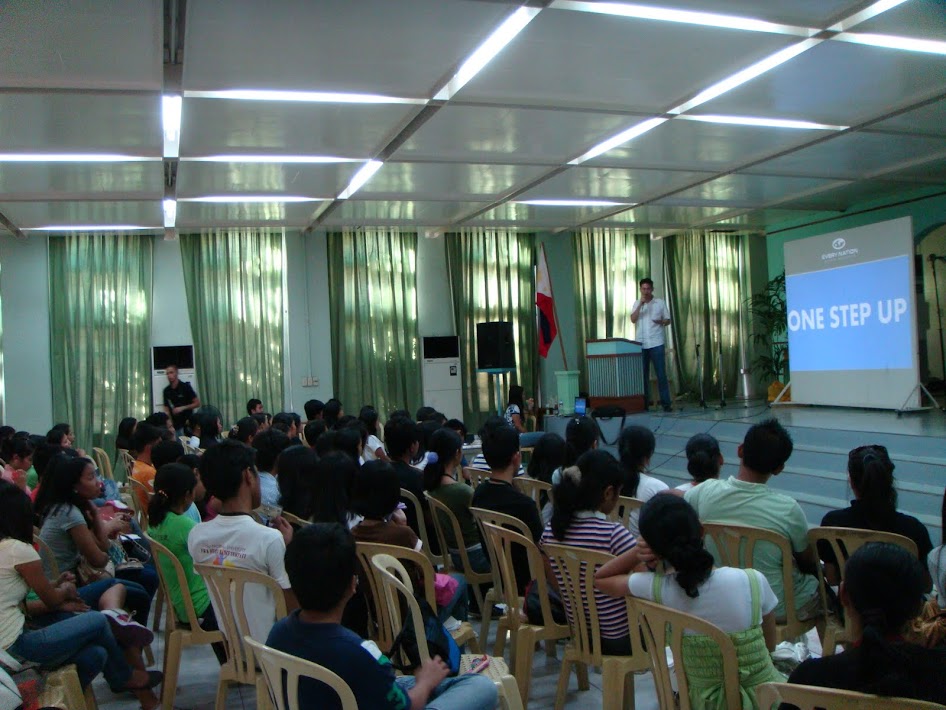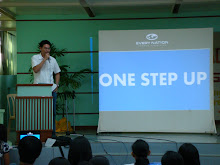 meeting with our creative people for possible marketing campaigns. Our discussion soon turned to the question, “What does it take to succeed in the industry?” I was intrigued by the answer, “a big ego.” Which leads me to ponder on the question, “Is a big EGO necessary for an entrepreneur or a leader to succeed?”
meeting with our creative people for possible marketing campaigns. Our discussion soon turned to the question, “What does it take to succeed in the industry?” I was intrigued by the answer, “a big ego.” Which leads me to ponder on the question, “Is a big EGO necessary for an entrepreneur or a leader to succeed?”Many experts tell us that a healthy ego is necessary to be both a leader and an entrepreneur. I agree.
 I believe that a healthy sense of self is needed to achieve the confidence required to do great things. But the problem with ego is that it is hungry and it has a HUGE appetite. The more we achieve, the more likely our egos grow. The potential for disaster will occur when our egos have grown bigger that our capabilities.
I believe that a healthy sense of self is needed to achieve the confidence required to do great things. But the problem with ego is that it is hungry and it has a HUGE appetite. The more we achieve, the more likely our egos grow. The potential for disaster will occur when our egos have grown bigger that our capabilities.We are taught by media that great accomplishments are done b
 y a single great man, a visionary leader, CEO or entrepreneur. We all know the stories of Bill Gates, Steve Jobs, Richard Branson, in other words, men of great ego. But do we realize that these great men are also leading great teams of highly talented individuals that allow them to be greater? Media often does not tell the whole true story. It fails to tell the roles that
y a single great man, a visionary leader, CEO or entrepreneur. We all know the stories of Bill Gates, Steve Jobs, Richard Branson, in other words, men of great ego. But do we realize that these great men are also leading great teams of highly talented individuals that allow them to be greater? Media often does not tell the whole true story. It fails to tell the roles that  other “small” people play in the success of these individuals. It also fails to tell the story of how these leaders manage their egos and mesh their teams to a common goal.
other “small” people play in the success of these individuals. It also fails to tell the story of how these leaders manage their egos and mesh their teams to a common goal.Henry Ford is famous as the father of the automobile. He
 is also credited with the invention of the assembly line. What is not reported are roles other people played in it. How many of us have heard of Peter E. Martin, the factory superintendent, Charles E. Sorensen, Martin’s assistant, C. Harold Wills, a draftsman and toolmaker, and Clarence W. Avery, and Charles Lewis, first line supervisors. They were Henry Ford’s engineers who helped come up with solutions that allowed the assembly line to become a reality. Among other improvements,
is also credited with the invention of the assembly line. What is not reported are roles other people played in it. How many of us have heard of Peter E. Martin, the factory superintendent, Charles E. Sorensen, Martin’s assistant, C. Harold Wills, a draftsman and toolmaker, and Clarence W. Avery, and Charles Lewis, first line supervisors. They were Henry Ford’s engineers who helped come up with solutions that allowed the assembly line to become a reality. Among other improvements,  they added a conveyer belt and built factories around the assembly line. With these improvements, it allowed Ford to produce 700,000 Model T’s, which was twice the output of all competitors combined.
they added a conveyer belt and built factories around the assembly line. With these improvements, it allowed Ford to produce 700,000 Model T’s, which was twice the output of all competitors combined.It is in
 sports wherein we see ego and its effects on the team clearly. We often hear of the petulance and childish ego of today’s superstars. But when we hear stories of champions, we see a different story. Shaq managed his ego when he supported Dwayne Wade into realizing his potential. This led to the Miami Heats first Championship. His inability to continue to manage his ego recently led to the infamous incident wherein he called out former teammates Chris Quin and Dorell Wright, as well
sports wherein we see ego and its effects on the team clearly. We often hear of the petulance and childish ego of today’s superstars. But when we hear stories of champions, we see a different story. Shaq managed his ego when he supported Dwayne Wade into realizing his potential. This led to the Miami Heats first Championship. His inability to continue to manage his ego recently led to the infamous incident wherein he called out former teammates Chris Quin and Dorell Wright, as well  as the very publicized profanity laced rap about how Kobe will never win without him. It had totally changed the publics view of Shaq from champion to well , form your own conclusion. (Hint, his deputy sheriff badge was recently revoked.)
as the very publicized profanity laced rap about how Kobe will never win without him. It had totally changed the publics view of Shaq from champion to well , form your own conclusion. (Hint, his deputy sheriff badge was recently revoked.)The San
 Antonio Spurs is a team that has no individual egos that are greater than the team goals. When Manu Ginobli won the sixth man of the year award, he said, ““I really don’t care about coming from the bench if that helps the team to win a championship. That is what I’m going to remember when I retire, the rings I have. Not the fact I played 28 minutes or 33 or my name being called in the starting lineup.”
Antonio Spurs is a team that has no individual egos that are greater than the team goals. When Manu Ginobli won the sixth man of the year award, he said, ““I really don’t care about coming from the bench if that helps the team to win a championship. That is what I’m going to remember when I retire, the rings I have. Not the fact I played 28 minutes or 33 or my name being called in the starting lineup.”The latest example are the current NBA champions Boston
 Celtics. It is a perfect example of how individual egos were meshed into the team goals. Paul Pierce was already an exceptional scorer the first day he put on the Celtic green. He was capable of lighting it up on the court every game but he suffered thru many seasons of playing for the green doormat. Ray Allen has been often described as having the purest stroke in the NBA. His shot never brought him close to the trophy. Kevin Garnett, the man child and physical “freak” of an athlete, who nature has gifted with speed and grace in a long lean 7 foot body, but his physical skills alone could not bring him up the mountain.
Celtics. It is a perfect example of how individual egos were meshed into the team goals. Paul Pierce was already an exceptional scorer the first day he put on the Celtic green. He was capable of lighting it up on the court every game but he suffered thru many seasons of playing for the green doormat. Ray Allen has been often described as having the purest stroke in the NBA. His shot never brought him close to the trophy. Kevin Garnett, the man child and physical “freak” of an athlete, who nature has gifted with speed and grace in a long lean 7 foot body, but his physical skills alone could not bring him up the mountain.The best part of the story was the prominent and unlikely roles played by the “role”
 players, Rajan Rondo, Kendrick Perkins and yes Leon Powe, who shocked the Lakers into believing he had the letter “R” attached to his name. It is a perfect example of how turning Ego to WEgo will result in championships. Paul, Ray, and Kevin
players, Rajan Rondo, Kendrick Perkins and yes Leon Powe, who shocked the Lakers into believing he had the letter “R” attached to his name. It is a perfect example of how turning Ego to WEgo will result in championships. Paul, Ray, and Kevin together with their coach Doc Rivers meshed their individual egos for the goals of the team. In doing so, they brought the 17th championship to the storied Boston Celtics franchise.
together with their coach Doc Rivers meshed their individual egos for the goals of the team. In doing so, they brought the 17th championship to the storied Boston Celtics franchise.The moral: Ego may make the leader feel good about himself, but it is in managing and harnessing it, motivating and leading others that will transform his self perception of greatness to public perception and acknowledgement. Let’s follow the examples of these ordinary individuals as they strive to make a difference. Each week, lets all get together and share knowledge, stories, experiences, information, all for the sole purpose of getting One Step Up.
For comments, suggestions or stories that you want to share, email me at
stirspecialist@gmail.com , or visit http://www.stirspecialist.blogspot.com/






Comments (0)
Post a Comment